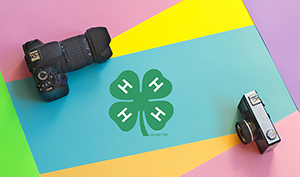The 4-H Photography project teaches youth about photography as an art, a science and a communication tool while developing and applying technical and artistic skills in film-based and digital photography. It is mainly intended for Grades 5-12.
We will work through the project together through:
- Regular meetings
- Photo challenges
- Work through the Photography Basics project book
- Workshops and photo safaris
- Sharing your images with the group, and offering critique and review of others’ photos
- Discussing your work with photography judges and displaying your images at the Photo Show and County Fair
- Documenting your progress and completing your 4-H record book
About the project workbooks:
The 4-H Photography project book is REQUIRED for the 2021-22 year. Please purchase the Photography Basics project book at our meeting, or online. You can order the books here: https://4-h.org/parents/curriculum/photography/
Level 1: Photography Basics
Photography Basics is a beginning level book for the study of photography. Activities cover four main areas: Equipment, Lighting, Composition, and Skill Building. Topics include flash, black & white photography, and taking selfies! Having access to a camera (phone or DSLR) is essential, as well as deciding how and where to store the photos taken during the project. This book will give youth the tools to succeed at and enjoy their photography journey.
Level 2: Next Level Photography
Next Level Photography, is an intermediate level book for a serious study of photography. Activities build on the four main areas from Level 1 (Equipment, Lighting, Composition, and Skill Building) and include topics such as the Rule of Thirds, Selecting a Lens, and Panorama. Having access to a camera (phone or DSLR) is essential, as well as deciding how and where to store the photos taken during the project.
Level 3: Mastering Photography
Mastering Photography, is an advanced level book for a serious study of photography. Activities build on the four main areas from Levels 1 and 2 (Equipment, Lighting, Composition, and Skill Building) and include topics such as Smartphone Exposure Tips, Low Light Challenges, and Studio Portraits. Having access to a camera (phone or DSLR) is essential, as well as deciding how and where to store the photos taken during the project.

